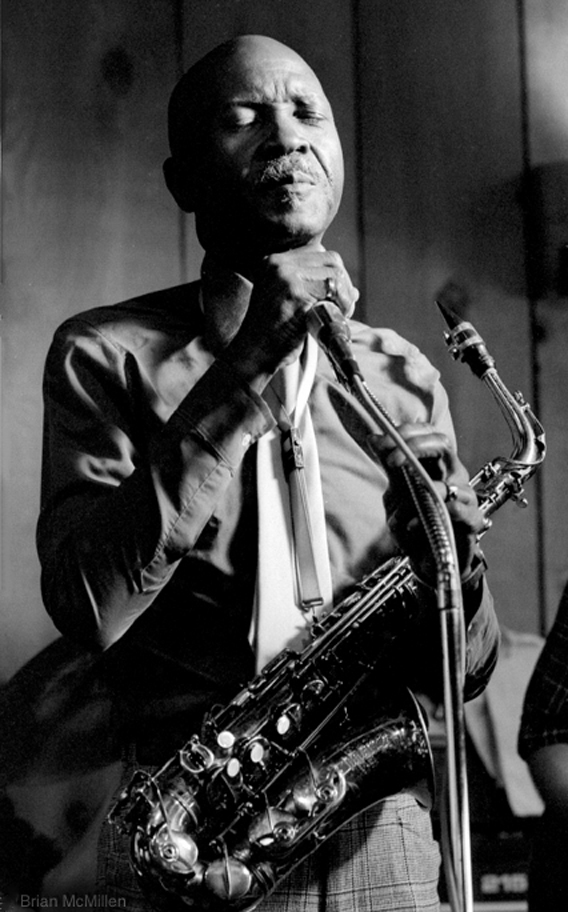|
Eddie Cleanhead Vinson
Eddie "Cleanhead" Vinson (born Edward L. Vinson Jr.; December 18, 1917 – July 2, 1988) was an American jump blues, jazz, bebop and R&B alto saxophonist and blues shouter. He was nicknamed Cleanhead after an incident in which his hair was accidentally destroyed by lye contained in a hair straightening product, necessitating shaving it off; enamoured of the look, Vinson maintained a shaved head thereafter. Music critic Robert Christgau has called Vinson "one of the cleanest—and nastiest—blues voices you'll ever hear." Biography Vinson was born in Houston, Texas. He was a member of the horn section in Milton Larkin's orchestra, which he joined in the late 1930s. At various times, he sat next to Arnett Cobb, Illinois Jacquet, and Tom Archia, while other members of the band included Cedric Haywood and Wild Bill Davis. After exiting Larkin's employment in 1941, Vinson picked up a few vocal tricks while on tour with bluesman Big Bill Broonzy. He then moved to New York and jo ... [...More Info...] [...Related Items...] OR: [Wikipedia] [Google] [Baidu] |
Houston
Houston (; ) is the most populous city in Texas, the most populous city in the Southern United States, the fourth-most populous city in the United States, and the sixth-most populous city in North America, with a population of 2,304,580 in 2020. Located in Southeast Texas near Galveston Bay and the Gulf of Mexico, it is the seat and largest city of Harris County and the principal city of the Greater Houston metropolitan area, which is the fifth-most populous metropolitan statistical area in the United States and the second-most populous in Texas after Dallas–Fort Worth. Houston is the southeast anchor of the greater megaregion known as the Texas Triangle. Comprising a land area of , Houston is the ninth-most expansive city in the United States (including consolidated city-counties). It is the largest city in the United States by total area whose government is not consolidated with a county, parish, or borough. Though primarily in Harris County, small portions of ... [...More Info...] [...Related Items...] OR: [Wikipedia] [Google] [Baidu] |
Oscar Peterson
Oscar Emmanuel Peterson (August 15, 1925 – December 23, 2007) was a Canadian virtuoso jazz pianist and composer. Considered one of the greatest jazz pianists of all time, Peterson released more than 200 recordings, won seven Grammy Awards, as well as a lifetime achievement award from the Recording Academy, and received numerous other awards and honours. He played thousands of concerts worldwide in a career lasting more than 60 years. He was called the "Maharaja of the keyboard" by Duke Ellington, simply "O.P." by his friends, and informally in the jazz community as "the King of inside swing". Biography Early years Peterson was born in Montreal, Quebec, to immigrants from the West Indies (Saint Kitts and Nevis and the British Virgin Islands); His mother, Kathleen, was a domestic worker and his father, Daniel, worked as a porter for Canadian Pacific Railway and was an amateur musician who taught himself to play the organ, trumpet and piano. Peterson grew up in the neighb ... [...More Info...] [...Related Items...] OR: [Wikipedia] [Google] [Baidu] |
Encyclopedia Of Popular Music
''The Encyclopedia of Popular Music'' is an encyclopedia created in 1989 by Colin Larkin. It is the "modern man's" equivalent of the '' Grove Dictionary of Music'', which Larkin describes in less than flattering terms.''The Times'', ''The Knowledge'', Christmas edition, 22 December 2007- 4 January 2008. It was described by ''The Times'' as "the standard against which all others must be judged". History of the encyclopedia Larkin believed that rock music and popular music were at least as significant historically as classical music, and as such, should be given definitive treatment and properly documented. ''The Encyclopedia of Popular Music'' is the result. In 1989, Larkin sold his half of the publishing company Scorpion Books to finance his ambition to publish an encyclopedia of popular music. Aided by a team of initially 70 contributors, he set about compiling the data in a pre-internet age, "relying instead on information gleaned from music magazines, individual experti ... [...More Info...] [...Related Items...] OR: [Wikipedia] [Google] [Baidu] |
Eddie Vinson 80
Eddie or Eddy may refer to: Science and technology * Eddy (fluid dynamics), the swirling of a fluid and the reverse current created when the fluid flows past an obstacle *Eddie (text editor), a text editor originally for BeOS and now ported to Linux and Mac OS X Arts and entertainment * ''Eddie'' (film), a 1996 film about basketball starring Whoopi Goldberg ** ''Eddie'' (soundtrack), the soundtrack to the film * ''Eddy'' (film), a 2015 Italian film * "Eddie" (Louie), a 2011 episode of the show ''Louie'' *Eddie (shipboard computer), in ''The Hitchhiker's Guide to the Galaxy'' *Eddy (Ed, Edd n Eddy), a character on ''Ed, Edd n Eddy'' *Eddie (mascot), the mascot for the British heavy metal band Iron Maiden *Eddie, an American Cinema Editors award for best editing *Eddie (book series), a book series by Viveca Lärn *Half of the musical duo Flo & Eddie *"Eddie", a song from the ''Rocky Horror Picture Show'' * "Eddie" (song), a 2022 song by the Red Hot Chili Peppers Places United State ... [...More Info...] [...Related Items...] OR: [Wikipedia] [Google] [Baidu] |
Ticknor & Fields
Ticknor and Fields was an American publishing company based in Boston, Massachusetts. Founded as a bookstore in 1832, the business would publish many 19th century American authors including Ralph Waldo Emerson, Nathaniel Hawthorne, Henry James, Henry Wadsworth Longfellow, Harriet Beecher Stowe, Henry David Thoreau, and Mark Twain. It also became an early publisher of ''The Atlantic Monthly'' and '' North American Review''. The firm was named after founder William Davis Ticknor and apprentice James T. Fields, although the names of additional business partners would come and go, notably that of James R. Osgood in the firm's later years. Financial problems led Osgood to merge the company with the publishing firm of Henry Oscar Houghton in 1878, forming a precursor to the modern publisher Houghton Mifflin Harcourt. Houghton Mifflin revived the Ticknor and Fields name as an imprint from 1979 to 1989. Company history Early years In 1832 William Davis Ticknor and John Allen bega ... [...More Info...] [...Related Items...] OR: [Wikipedia] [Google] [Baidu] |
Rock Albums Of The Seventies
''Christgau's Record Guide: Rock Albums of the Seventies'' is a music reference book by American music journalist and essayist Robert Christgau. It was first published in October 1981 by Ticknor & Fields. The book compiles approximately 3,000 of Christgau's capsule album reviews, most of which were originally written for his "Consumer Guide" column in ''The Village Voice'' throughout the 1970s. The entries feature annotated details about each record's release and cover a variety of genres related to rock music. Christgau's reviews are informed by an interest in the aesthetic and political dimensions of popular music, a belief that it could be consumed intelligently, and a desire to communicate his ideas to readers in an entertaining, provocative, and compact way. Many of the older reviews were rewritten for the guide to reflect his changed perspective and matured stylistic approach. He undertook an intense preparation process for the book during 1979 and 1980, which temporarily ... [...More Info...] [...Related Items...] OR: [Wikipedia] [Google] [Baidu] |
Robert Christgau
Robert Thomas Christgau ( ; born April 18, 1942) is an American music journalist and essayist. Among the most well-known and influential music critics, he began his career in the late 1960s as one of the earliest professional rock critics and later became an early proponent of musical movements such as hip hop, riot grrrl, and the import of African popular music in the West. Christgau spent 37 years as the chief music critic and senior editor for ''The Village Voice'', during which time he created and oversaw the annual Pazz & Jop critics poll. He has also covered popular music for ''Esquire'', '' Creem'', '' Newsday'', ''Playboy'', ''Rolling Stone'', '' Billboard'', NPR, '' Blender'', and '' MSN Music'', and was a visiting arts teacher at New York University. CNN senior writer Jamie Allen has called Christgau "the E. F. Hutton of the music world – when he talks, people listen." Christgau is best known for his terse, letter-graded capsule album reviews, composed in a ... [...More Info...] [...Related Items...] OR: [Wikipedia] [Google] [Baidu] |
Hair Straightening
Hair straightening is a hair styling technique used since the 1890s involving the flattening and straightening of hair in order to give it a smooth, streamlined, and sleek appearance. It became very popular during the 1950s among black males and females of all races. It is accomplished using a hair iron or hot comb, chemical relaxers, Japanese hair straightening, Brazilian hair straightening, or roller set/ blowdryer styling. In addition, some shampoos, conditioners, and hair gels can help to make hair temporarily straight. The process is often called "rebonding" in some countries from Southeast Asia (e.g. Indonesia, Singapore, Malaysia and Philippines). If done often, flat irons and chemicals can be damaging to hair. Excessive straightening often results in split ends. However, heat protectant sprays can decrease the damage. Methods Temporary (non-chemical treatment) Hair irons and hot combs are designed to temporarily modify the shape/texture of hair. The straightened ... [...More Info...] [...Related Items...] OR: [Wikipedia] [Google] [Baidu] |
Nickname
A nickname is a substitute for the proper name of a familiar person, place or thing. Commonly used to express affection, a form of endearment, and sometimes amusement, it can also be used to express defamation of character. As a concept, it is distinct from both pseudonym and stage name, and also from a title (for example, City of Fountains), although there may be overlap in these concepts. Etymology The compound word ''ekename'', literally meaning "additional name", was attested as early as 1303. This word was derived from the Old English phrase ''eac'' "also", related to ''eacian'' "to increase". By the 15th century, the misdivision of the syllables of the phrase "an ekename" led to its rephrasing as "a nekename". Though the spelling has changed, the pronunciation and meaning of the word have remained relatively stable ever since. Conventions in various languages English nicknames are generally represented in quotes between the bearer's first and last names (e.g., '' ... [...More Info...] [...Related Items...] OR: [Wikipedia] [Google] [Baidu] |
Blues Shouter
A blues shouter is a blues singer, often male, capable of singing unamplified with a band. Notable blues shouters include: *Piney Brown * Walter Brown, of the Jay McShann orchestra *H-Bomb Ferguson *Wynonie Harris *Screamin' Jay Hawkins *Duke Henderson, who operated mainly in the late 1940s and early 1950s. *Jimmy Rushing, blues shouter with Count Basie. *Big Joe Turner – his style hardly changed at all between 1938's " Roll 'Em Pete", and 1954's "Shake, Rattle and Roll". AllMusic called Turner "the premier blues shouter of the postwar era". *Eddie "Cleanhead" Vinson, an unusual combination of blues shouter and bebop alto saxophone player. *Big Joe Williams *Jimmy Witherspoon, who also appeared with Jay McShann. * Billy Wright *Howlin' Wolf Chester Arthur Burnett (June 10, 1910January 10, 1976), better known by his stage name Howlin' Wolf, was an American blues singer and guitarist. He is regarded as one of the most influential blues musicians of all time. Over a four-decade ... [...More Info...] [...Related Items...] OR: [Wikipedia] [Google] [Baidu] |
Saxophonist
The saxophone (often referred to colloquially as the sax) is a type of single-reed woodwind instrument with a conical body, usually made of brass. As with all single-reed instruments, sound is produced when a reed on a mouthpiece vibrates to produce a sound wave inside the instrument's body. The pitch is controlled by opening and closing holes in the body to change the effective length of the tube. The holes are closed by leather pads attached to keys operated by the player. Saxophones are made in various sizes and are almost always treated as transposing instruments. Saxophone players are called ''saxophonists''. The saxophone is used in a wide range of musical styles including classical music (such as concert bands, chamber music, solo repertoire, and occasionally orchestras), military bands, marching bands, jazz (such as big bands and jazz combos), and contemporary music. The saxophone is also used as a solo and melody instrument or as a member of a horn section in some styl ... [...More Info...] [...Related Items...] OR: [Wikipedia] [Google] [Baidu] |
Bebop
Bebop or bop is a style of jazz developed in the early-to-mid-1940s in the United States. The style features compositions characterized by a fast tempo, complex chord progressions with rapid chord changes and numerous changes of key, instrumental virtuosity, and improvisation based on a combination of harmonic structure, the use of scales and occasional references to the melody. Bebop developed as the younger generation of jazz musicians expanded the creative possibilities of jazz beyond the popular, dance-oriented swing music-style with a new "musician's music" that was not as danceable and demanded close listening.Lott, Eric. Double V, Double-Time: Bebop's Politics of Style. Callaloo, No. 36 (Summer, 1988), pp. 597–605 As bebop was not intended for dancing, it enabled the musicians to play at faster tempos. Bebop musicians explored advanced harmonies, complex syncopation, altered chords, extended chords, chord substitutions, asymmetrical phrasing, and intricate melodies ... [...More Info...] [...Related Items...] OR: [Wikipedia] [Google] [Baidu] |




.jpg)


